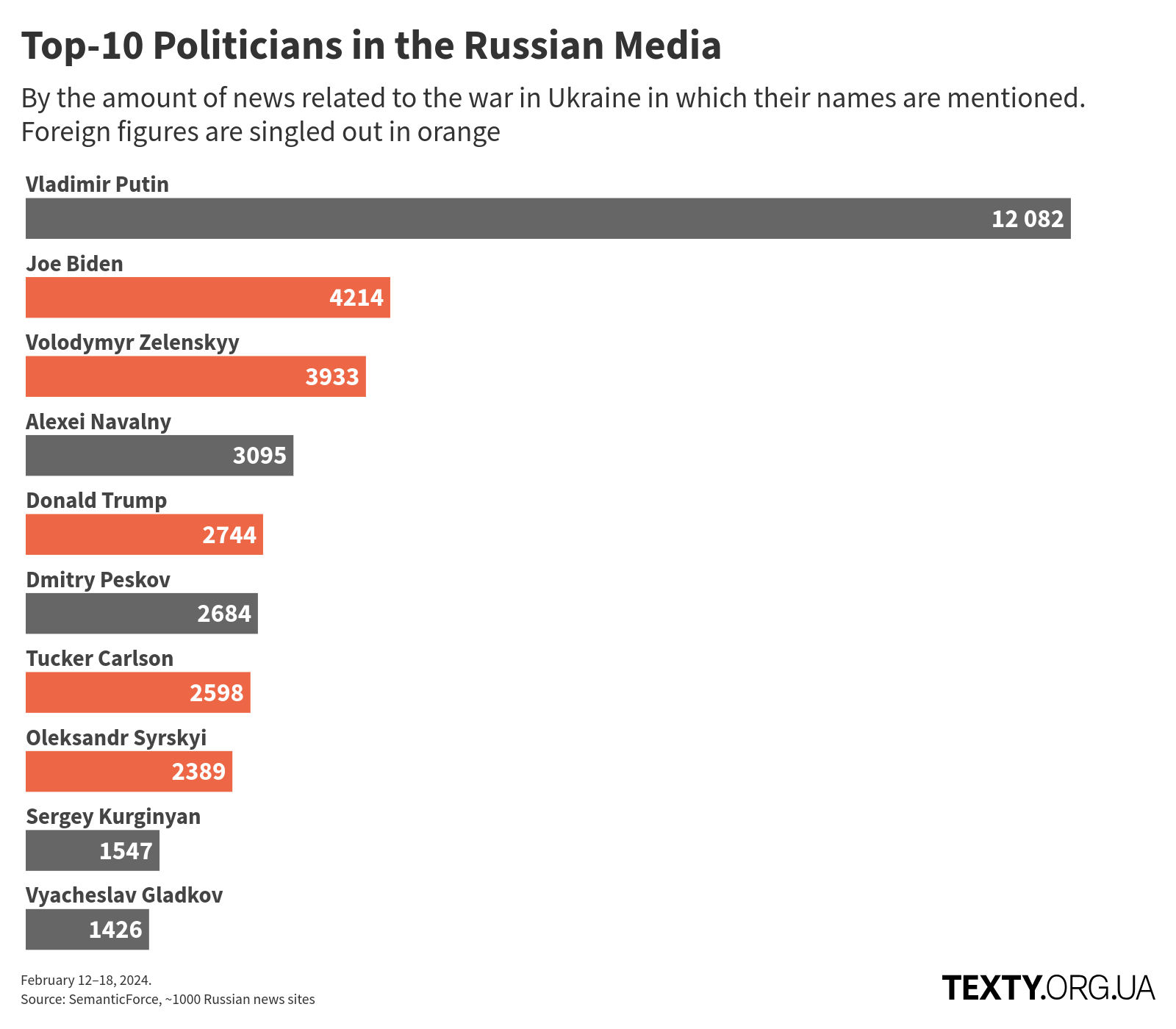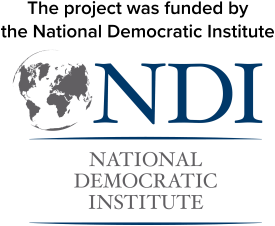Navalny’s Death: the Hand of the West. Russian Media Monitoring Report, 12-18 February 2024
Last week, Russian media celebrated the capture of Avdiivka which is said to mark a new phase of the war that paved the way for Russia’s victory. In addition to protecting the people of Donbas from the Ukrainian Nazis, the Russian army is said to be preparing a large-scale offensive to capture the entire region. The disinformers avoid mentioning the cost of flying the Russian flag over the rubble of the destroyed city — instead, they claim that Avdiivka is Zelensky’s Waterloo. The news of Navalny’s death also received considerable attention, but no surprises here: it was said to have been orchestrated by the West to disrupt the presidential election in Russia.
This monitoring report covers these and other topics of the disinformation spread by Russian state media and online para journalists to manipulate public opinion.

Ecstasy over Avdiivka
Our previous monitoring reports showed a certain decrease in the attention of Russian media to the war in Ukraine. They mostly offered reports of the mass destruction of Ukrainian troops or presented arguments for Russia's imminent victory.
The capture of Avdiyivka breathed new life into the subject for being the first real advance of the Russian army in a long time, albeit a minor one. Without new territorial gains, the disinformers had to fabricate fakes or exaggerate the numbers of Ukrainian losses.
The propaganda presented the capture of Avdiivka as Zelensky’s defeat which had happened shortly after the recent visit of the Ukrainian president to the front lines. The so-called experts said that “Zelensky was slapped in the face by a Russian fighter”.
According to the propagandists, now that Avdiivka is under Russian control, things will pick up the pace. The losses are being justified by claiming that the Russian army has achieved its goal of securing Donetsk.
Local media in Russian regions are praising the local heroes. It seems as if every region of Russia is basking in the glory of capturing the ruins of the city: Ossetia (“Our Ossetian fighters played a major role in the liberation of Avdeevka together with their Russian brothers”), Chelyabinsk (“We bow our heads to the courage and heroism of our fellow countryman who has received the regional award from the governor of the Chelyabinsk region, Alexey Teksler”), Tuva, and Moscow alike.
The propaganda has been wrapping up the capture of Avdiivka into a gift to be presented to the Russian people during Putin’s presidential campaign.
Targeting Putin with Navalny’s Death
The name of Alexei Navalny has made the first appearance on our list of people mentioned in the Russian media. This was due to the death of the opposition politician in a Russian prison on 16 February.
Russian media immediately hurried to whitewash the reputation of the Russian government.
Firstly, they claimed that Navalny was an agent of the West who had been engaged in subversive activities to undermine Russia. Therefore, he is not to be missed: “And when Navalny showed his true colors by supporting the openly Russophobic neo-fascist junta in Ukraine, the last doubts about his mission as a direct agent of Russia's enemies finally disappeared”.
They assured that Kremlin had no interest in Navalny’s death and said that his real influence was overhyped: “Navalny’s following in Russia is only a myth”. His demise was said to be part of the plan to disrupt the presidential campaign: “Navalny dies a sudden death just one month before Putin’s election? The elections that the American and British intelligence agencies desperately want to torpedo? An accident, you think? This is highly unlikely which is why the investigators should focus on the “sacred sacrifice” version”.
Some even began to throw direct accusations at the West. For instance, the propagandist and presenter Tina Kandelaki called the death of Alexei Navalny “a gift for Russia haters”. They reminded the Russian presidential election was due in a month. “Alexei Navalny, who was quite active and full of life, suddenly meets his maker,” wrote Kandelaki. “This happens amid a growing trend of pro-Russia sentiment in the world. This death is bound to be used by Russia’s enemies to mount a wave of hatred towards Russia in the West”.
Overall, the main version of the propaganda was that Navalny died a natural death from a blood clot. His death was said to be bad for Russia and Putin in particular which is why the investigators should focus on exposing the West which has a long history of trying to interfere with Russia.
The Problems
As the so-called presidential election campaign in Russia is coming to an end, Russians are being convinced about the country’s achievements under Putin’s rule. While staying loyal to the regime, the media cannot completely ignore economic problems.
Friendly Sanctions, Again
For several weeks now, Russian propaganda has been struggling to explain why the countries that are considered friendly to Russia are joining the Western sanctions: “Businessmen from Russia have been facing widespread restrictions on payments in Turkey since the beginning of 2024 — their accounts are being blocked more often”, “Turkey, one of Russia”s main anti-sanctions hubs which has been instrumental in replacing Western goods, has sharply reduced supplies in early 2024”.
This seems to be a painful blow because disinformers have been claiming that the Russian economy is immune to Western sanctions because 1) Russia is taking active steps towards import substitution and trade diversification, and 2) Russia has friends who are willing to lend a hand. And now, banks in Turkey and China are joining the sanctions and imposing restrictions.
The propaganda chose the easiest defense strategy: the problems are said to be only temporary and to be resolved shortly.
Other news outlets blamed the United States: “Due to Washington’s threats of sanctions Turkish banks are refusing to do business with Russian counterparties which causes delays in payments — for example, those under cross-border trade contracts”. “The Russian economy should expect a relief after the elections in the United States”.
The Key Interest Rate: a Cause for Concern
Last week, some Russian media expressed careful concerns about the key interest rate.
The key interest rate is the most important tool used by the central bank to control inflation. By raising the key interest rate, the Central Bank encourages banks to make loans to businesses and individuals more expensive.
At the recent briefing, “the head of the Central Bank Elvira Nabiullina said that the increments to reduce the key rate will depend, among other things, on inflation risks”. However, the propagandists twisted Nabiullina’s words by claiming that the key interest rate could soon be brought down to reflect a decline in inflation.
In 2021, there was a period when the key interest rate in Russia remained at 4.25%. After the full-scale invasion, it soared to 20% and then rebounded to the current level of 16%.
The propagandists argued that this situation was only temporary, and that “the interest rate will smoothly return to the neutral range”. Those assurances were also supported by the so-called experts who promised a drop in the key interest rate in the second quarter of 2024.

The Methodology
To monitor the information published on disinformation websites, we analyzed approximately 500,000 news reports collected from ~ 1,000 Russian websites. The data for the analysis was collected and provided by SemanticForce.
Each paragraph was processed using an algorithm that defines its topic automatically. The resulting topics (i.e. groups with similar content) were short-listed by the topics relating to the war or its consequences for Russia. The number of mentions of a certain topic was then counted for each publication. Our conclusions are based on the respective findings and the quotes from paragraphs referring to each topic.


